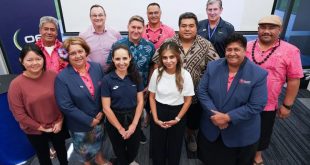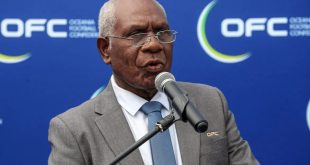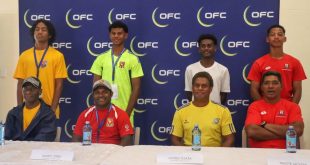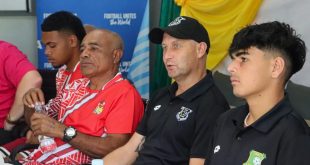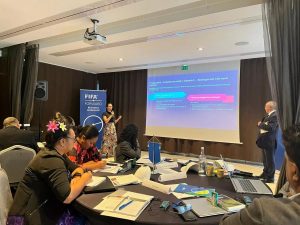 The Financial Governance Workshop for Oceanian MAs kicked was successfully delivered in Noumea, New Caledonia, led by Christoph Suppiger, Head of MA Finance Services, and MA Finance Services Manager, Leonard Gruter. They were aptly supported by Elena Galluccio of Control Risk, who is one of the external audit firms engaged by FIFA as part of the FIFA Forward Programme’s central audit review process.
The Financial Governance Workshop for Oceanian MAs kicked was successfully delivered in Noumea, New Caledonia, led by Christoph Suppiger, Head of MA Finance Services, and MA Finance Services Manager, Leonard Gruter. They were aptly supported by Elena Galluccio of Control Risk, who is one of the external audit firms engaged by FIFA as part of the FIFA Forward Programme’s central audit review process.
The workshop attendees included the General Secretaries of all 11 member associations, along with their senior finance officers, who came together for 3 days in Noumea.
Suppiger was keen to highlight how MAs can access the FIFA Forward funding in order to get the optimum return to invest in their infrastructure.
“The FIFA Forward Programme is a key driver of football development through the provision of funds across the global football community,” he said. Therefore, strong financial governance structures, processes and procedures will continue to remain as critical features of an MA’s operations to ensure that the funds are managed in a credible, transparent, and accountable manner.
“It is our ambition to best support our MAs as per these good financial governance principles by providing them with the best tools, guidance, and support so that they can continue to make the most of the funds.”
The purpose of the seminar was to discuss the general issues identified as part of the audit and reporting process, as well as the specific cases relevant to the Member Associations (MAs) of Oceania. The presentations canvassed a wide range of topics, with a key focus on those areas of common weaknesses, identified in the successive years of the central review including the main observations and other recurrent issues as well as best practice principles.
During the workshop, MAs had the opportunity to interactively exchange ideas, allowing FIFA to gather feedback and views in various areas, including the experiences of MAs from the audit and reporting process.
A key deliverable of the MA Financial Governance & Oversight Services was the production of the Financial Governance Guide in 2023, and this was introduced during the workshop. It was prepared by a team composed of the external auditors, FIFA and thereafter consolidated by FIFA, with the principle aim of ensuring that the outcome was a relevant, coherent, consistent, and usable guide.
“The document is a manual that is understood and used by MAs, to improve their operational capacity and management, financial governance, internal procedures and compliance matters and to best prepare them for the central review,” explained Leonard Grüter.
The formulation of the manual and its applications were detailed throughout the workshop. Elena Galluccio of Control Risks facilitated the sessions on theory and group work and provided examples of the concrete application of the guide for MAs.
Important to the success of the workshop was the need to hear from member associations themselves. The Solomon Islands, Fiji, and New Zealand shared initiatives they had undertaken to strengthen their operations in the areas of subsequent recipients, acquittals and internal communication respectively.
El Hadji Diop, the Lead from the Regional Office in Dakar, participated in the workshop alongside his colleagues from the FIFA Regional Office in Auckland, and presented on the main challenges in his region, as well as some key learnings and solutions which proved invaluable for the participants.
The OFC are key development partners of FIFA in Oceania and were represented in Noumea by Flavia Lopes, Head of MA Services at the confederation. Lopes detailed the OFC Development Programme to deepen the understanding of its funding framework and requirements and also highlighted key challenges on the process and consequences of non-compliance.
 Arunava about Football A look at football & the world through my eyes!
Arunava about Football A look at football & the world through my eyes!

